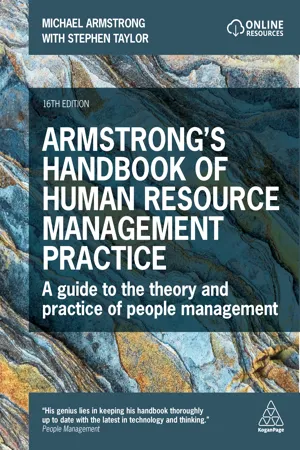
Armstrong's Handbook of Human Resource Management Practice
A Guide to the Theory and Practice of People Management
- 760 pages
- English
- ePUB (mobile friendly)
- Available on iOS & Android
Armstrong's Handbook of Human Resource Management Practice
A Guide to the Theory and Practice of People Management
About this book
Armstrong's Handbook of Human Resource Management Practice is the definitive resource for HRM students and professionals, helping readers understand and implement HR to align with business needs. This book provides detailed coverage of all areas essential to the HR function such as employment law, employee relations, learning and development, performance management and reward management. It also covers the HR skills needed to ensure professional success, including leadership, managing conflict, interviewing and using statistics. It is illustrated throughout in full colour and has a range of pedagogical features to consolidate learning such as source review boxes, key learning points and case studies from international organizations such as IBM, HSBC and Johnson and Johnson. This fully updated 16th edition includes new chapters on managing remote workers and developments in digital human resource management practices. There are also updates to reflect the changes throughout the HR function, such as performance leadership, 'smart' reward and employee wellbeing. Armstrong's Handbook of Human Resource Management Practice is suited to both professionals and students of undergraduate and postgraduate degrees. It is also aligned with the Chartered Institute of Personnel and Development (CIPD) profession map so can be used by those studying the Associate Level 5 and Advanced Level 7 qualifications. Online supporting resources include comprehensive handbooks for lecturers and students, lecture slides, all figures and tables, toolkits, and a literature review, glossary and bibliography.
Frequently asked questions
- Essential is ideal for learners and professionals who enjoy exploring a wide range of subjects. Access the Essential Library with 800,000+ trusted titles and best-sellers across business, personal growth, and the humanities. Includes unlimited reading time and Standard Read Aloud voice.
- Complete: Perfect for advanced learners and researchers needing full, unrestricted access. Unlock 1.4M+ books across hundreds of subjects, including academic and specialized titles. The Complete Plan also includes advanced features like Premium Read Aloud and Research Assistant.
Please note we cannot support devices running on iOS 13 and Android 7 or earlier. Learn more about using the app.
Information
Table of contents
- List of figures
- List of tables
- Preface
- PART I Fundamentals of human resource management
- 01 The essence of HRM
- 02 Human capital management
- 03 The context of HRM
- 04 The future of work
- 05 HRM and organizational performance
- 06 The ethical dimension of HRM
- 07 Corporate social responsibility
- PART II The strategic approach to HRM
- 08 Strategic HRM
- 09 HR strategy
- PART III Delivering HR
- 10 The role of HR
- 11 The HRM role of line managers
- PART IV Human resource management processes
- 12 Evidence-based HRM
- 13 HR analytics
- 14 Digital HRM
- 15 Knowledge management
- 16 Competency-based HRM
- PART V Organization
- 17 Organizational behaviour
- 18 Organization design
- 19 Work design
- 20 Job design
- 21 Organization development
- PART VI Factors affecting the behaviour of people at work
- 22 Motivation
- 23 Commitment
- 24 Employee engagement
- PART VII People resourcing
- 25 Resourcing strategy
- 26 Workforce planning
- 27 Recruitment and selection
- 28 Talent management
- PART VIII Employment practices
- 29 The employee experience
- 30 Managing employment
- 31 Managing diversity and inclusion
- 32 Managing flexibility
- 33 Managing home and hybrid working
- PART IX Learning and development
- 34 The basis of learning and development
- 35 Strategic learning and development
- 36 Organizational learning and the learning organization
- 37 Individual learning
- 38 The process of learning and development
- 39 The practice of learning and development
- 40 Leadership and management development
- PART X Performance management
- 41 The basis of performance management
- 42 Performance management systems
- 43 Performance leadership
- PART XI Reward management
- 44 The basis of reward management
- 45 Reward strategy
- 46 The practice of reward management
- 47 Managing reward for special groups
- 48 Reducing the gender pay gap
- PART XII Employment relations
- 49 The basis of employment relations
- 50 Employment relations strategy
- 51 The employment relationship
- 52 The psychological contract
- 53 The practice of industrial relations
- 54 Employee voice
- 55 Employee communications
- PART XIII Employee wellbeing
- 56 Principles and practice of employee wellbeing
- 57 Health and safety
- PART XIV HR practices
- 58 HR policies
- 59 HR procedures
- 60 Dealing with the legal aspects of employment
- PART XV International HRM
- 61 The basis of international HRM
- 62 The practice of international HRM
- 63 Managing expatriates
- PART XVI People management skills and competencies
- 64 Strategic people management skills
- 65 Business skills
- 66 Dealing with business issues from an HR perspective
- 67 Problem-solving and decision-making skills
- 68 Analytical and critical skills
- 69 Research skills
- 70 Statistical skills
- 71 Selection interviewing skills
- 72 Job, role and skills analysis and competency modelling
- 73 Learning and development skills
- 74 Negotiating skills
- 75 Change management
- 76 Influencing skills
- 77 Leadership
- 78 Handling people problems
- 79 Handling challenging conversations
- 80 Managing conflict
- 81 Political skills
- 82 Project management
- PART XVII Conclusion
- 83 Trends in HRM
- CIPD profession map: Cross-references to text
- Author index
- Subject index